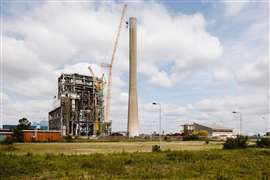Ban on engineered stone in the works in Australia amid silicosis fears
28 February 2023
Australia is exploring the mechanics of a ban on the domestic use of engineered stone amid fears that its use is causing lung disease among construction workers.
 Engineered stone has been linked to increased cases of lung disease among workers in Australia (Image: Adobe Stock)
Engineered stone has been linked to increased cases of lung disease among workers in Australia (Image: Adobe Stock)
Workplace relations minister Tony Burke said that there had been a unanimous decision across every state, territory and commonwealth in Australia supporting a ban.
He has now asked Australia’s health and safety body Safe Work Australia to work up plans on how regulations banning the product would work.
Engineered stone, primarily used for kitchen countertops in domestic applications, is made crushed stone (often including quartz crystals) held together with a resin binder.
They have an appearance similar to natural stone but contain high levels of silica. When cut, engineered stone generates large quantities of silica dust.
Silica dust can put workers at risk of diseases like silicosis and long-term dust exposure can lead to lung cancer.
The ban would not affect other options like natural stone. Advocates for the ban have also argued that other options for countertops exist such as laminate and timber.
Following the meeting between states and territories about the ban earlier this week, Burke Burke said, “We have now tasked Safe Work Australia to scope out what regulation is required for all workplaces where you deal with silica dust. And to also scope out specifically with respect to engineered stone and engineered stone bench tops to do the work, starting now, on what a ban would look like.”
He added, “Not all engineered stone is at 97%-98% silica. There are some forms that are at much lower levels and therefore present a much lower risk – some where the risk is actually no different to natural stone.
“We what we have asked Safe Work Australia to do is to scope out if there were to be a prohibition, where that line would be drawn. And then to also scope out how you can have a nationally consistent licensing system for whatever remains as being viewed as safe to be on the market but making sure that it would have serious work health and safety issues.
“That licensing system would also have to apply to legacy products. We need to remember now even for the most dangerous of these products, they will now be in kitchens where as long as they are left along they will be quite safe.
“But what happens if that homeowner decides to renovate? Effectively the experience that we went through with asbestos is now going to be with us as we work through the legacy items on these engineered stone benchtops.”
STAY CONNECTED


Receive the information you need when you need it through our world-leading magazines, newsletters and daily briefings.
CONNECT WITH THE TEAM











